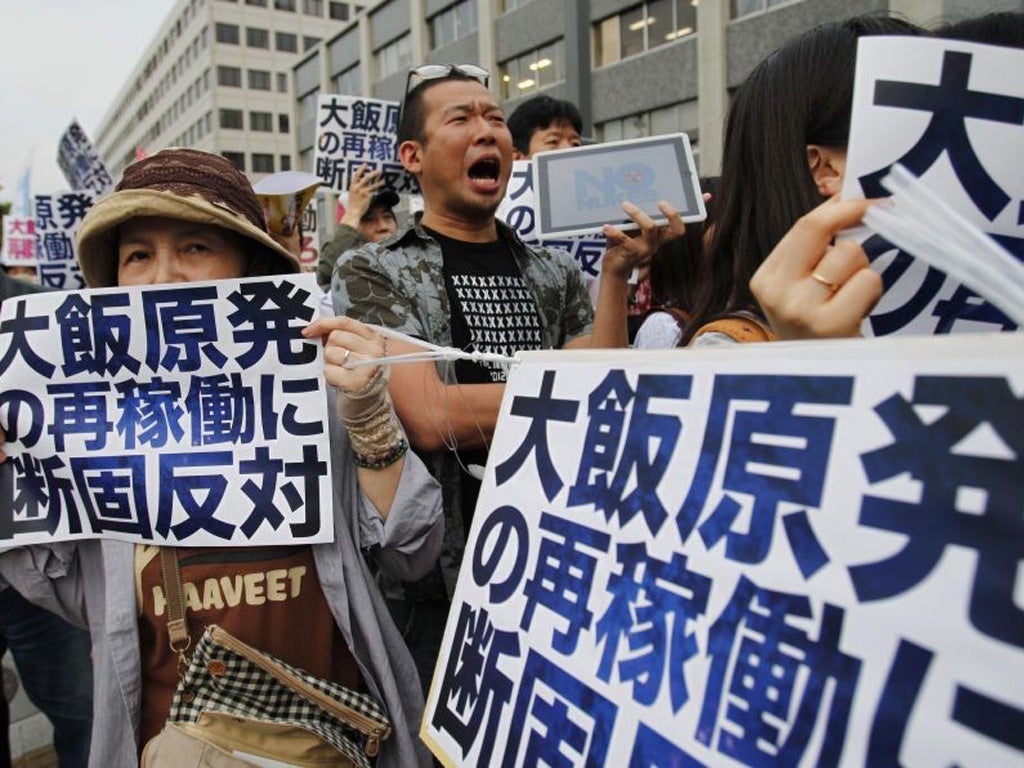Japan's power hub braced for big switch-on
Japan's reactors have lain idle since the tsunami crippled the Fukushima plant. Now the government wants to turn them on again. By David McNeill

"They chose the most stunning places in Japan for nuclear plants," says Jiku Miyazaki, and it is hard to disagree when you are in Oi. The small fishing town shelters in a rugged cove ringed by rice paddies and mountains which once cut it off from Kyoto and Osaka. The postcard beauty is only slightly marred by towering orange pylons and cables which traverse the mountains to the four-reactor power plant near the bay.
Since the 1970s, these power lines have fed electricity to Japan's second-largest concentration of people and industry, the vast urban area called Kansai. In return, the plant's remote host – population 8,800 – has become strikingly prosperous. New schools, hospitals and recreation centres dot the countryside. A hot spring resort and a baseball stadium dominate either end of Oi.
The reactors that generated this largesse, however, have been shut down since last year and are being kept idle by Japan's post-Fukushima fear of nuclear energy. Mr Miyazaki, a veteran opponent of the nuclear industry, is one of many who hope they never start again. "I never liked having the plant nearby, but I didn't know till 11 March, 2011, exactly how terrifying it is," he says.
The shockwaves from last year's Fukushima nuclear disaster, the worst in 25 years, rippled across the planet, accelerating the industry's demise in Germany, Italy and elsewhere. In Japan, the crisis forced about 200,000 people to evacuate their homes and triggered an agonised and unresolved national debate that has put this dot on the map, 250 miles west of Tokyo, under an increasingly uncomfortable spotlight.
Anti-nuclear protesters camp permanently in the town. Supermarkets have put up signs warning reporters not to harass customers for their views on the sleeping nuclear giant. The local government has been inundated with calls, many hostile, demanding information on when, or if, the reactors will restart. "I've no idea why we have been chosen to carry this burden," laments Oi spokesman Yasufumi Saruhashi.
If the government has its way, Oi will become the first host town since the crisis to restart its idling reactors. On Friday, Prime Minister Yoshihiko Noda made a televised appeal for the country to back a restart at two of Oi's reactors, saying it was crucial to ensure a stable power supply. But despite many sympathisers in Oi, the government has a long way to go in broadening that support outside the towns which directly benefit from the plants.
Oi belongs to one of the planet's heaviest concentrations of nuclear power generation: 13 reactors at four plants strung along a 50km-odd stretch of the Japan Sea coast – an area known as the "nuclear Ginza".
Further up the coast is the seven-reactor Kashiwazaki complex, the world's largest – part of a 50-reactor network that supplied about a third of Japan's electricity before March 2011. One by one during the past year, the reactors have been powered down for inspections, leaving the nation nuclear free for the first time since the 1970s. Before they can restart they must pass new stress tests and win the backing of their hosts. Opponents such as Tetsuen Nakajima insist the plants can never be made safe in a country which has a fifth of the world's strong earthquakes. Among his worst fears is that radiation from a future disaster will poison Lake Biwa, which supplies drinking water to 15 million people in Kansai.
Mr Nakajima's fears do not resonate in Oi. A survey in May by state broadcaster NHK found 64 per cent of the town's population in favour of restarting the plant's idling reactors, with only 28 per cent against. But in Obama, 10km away, 55 per cent oppose a restart. Post-Fukushima, most Japanese say they are anti-nuclear. Many in Oi, however, say they can't come online soon enough. "We need nuclear power in this country," says Ishinobu Ide, a local small businessman. "We don't have any resources."
Millions of Kansai residents have been warned to expect a long hot summer if the reactors are not switched back on. But Mr Saruhashi says if opponents can stall the restart till Japan's traditional summer peak, 15 August, the public will see the threats of the nuclear and business lobbies have been a bluff. "Something has definitely changed in Japan since the Fukushima crisis," he says. "We have yet to see how much."
Subscribe to Independent Premium to bookmark this article
Want to bookmark your favourite articles and stories to read or reference later? Start your Independent Premium subscription today.

Join our commenting forum
Join thought-provoking conversations, follow other Independent readers and see their replies